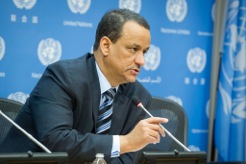Cairo, Riyadh – The Yemeni government announced on Thursday that it would not participate in the second round of peace talks, which were scheduled to be held on Friday in Kuwait.
The head of the Yemeni government’s advisory group, Abdullah Al-Olaymi, said on his Twitter account that the Yemeni government delegation will be ready to go to Kuwait when the atmosphere of consultations becomes appropriate.
A Yemeni governmental source was quoted by AFP as saying that the government postponed its participation in Kuwait Talks till after the Arab Summit, which will be held in Nouakchott in Mauritania later this month.
Yemeni Deputy Prime Minister and Civil Service Minister Abdulaziz Al-Jabari said the government was keen on conducting positive negotiations in Kuwait and reaching a peace agreement.
In comments to Asharq al-Awsat newspaper, Al-Jabari said: “We want to commit to the regulations to implement what has been agreed on.” He added that participating in the negotiations with the same current circumstances would lead to results similar to those reached in the first round of talks.
Al-Jabari stressed the importance of implementing U.N. Security Council Resolution 2216 which stipulates the disarmament of militias and their withdrawal from Yemeni provinces.
He added that any agreement that does not include those conditions would stretch the war and armed conflicts.
Commenting on the departure of the Houthis’ delegation to Kuwait to participate in the negotiations and whether such step would be in favor of the rebel group, Al-Jabari said: “It is not about scoring points; it is a fateful matter. Yemen’s present and future depend on the result of the Kuwait Talks.
Meanwhile, Yemeni officials were surprised with a meeting held between U.N. Special Envoy for Yemen Ismail Ould Cheikh Ahmed and ousted President Ali Abdullah Saleh.
A Yemeni official source said the meeting was a “provocative step” and a reaction by the international envoy on government’s decision not to participate in the second round of talks.
In exclusive remarks to Asharq al-Awsat, the Yemeni official questioned whether the United Nations, through its special envoy and secretary general, was circumventing international resolutions, including the resolution that imposes sanctions of some figures involved with the rebellion.
He added that the special envoy’s reaction would make him a party in the conflict as he crossed all red lines that prevent him from directly communicating with those sanctioned by international resolutions, including UNSCR 2216.
Meanwhile, Yemeni sources said that Houthi rebels were trying to revoke the U.N. resolution, noting that during the meeting with Ould Cheikh Ahmed, the ousted president put forth a series of conditions, including the halting of airstrikes by the allied forces and lifting their control along the Yemeni coast. Saleh also asked for lifting sanctions imposed on him and his brother by the Security Council.
